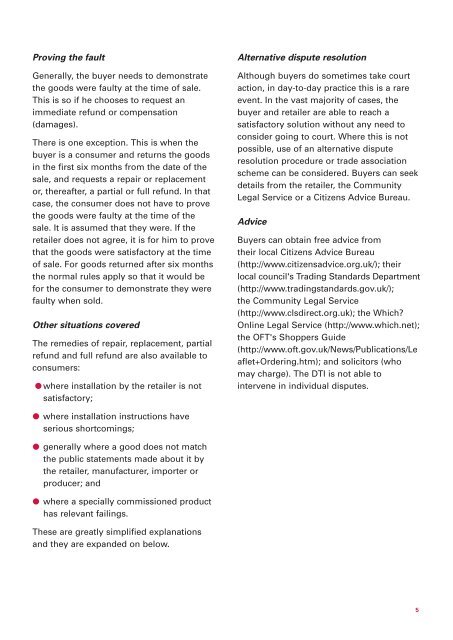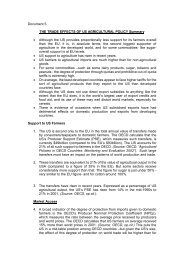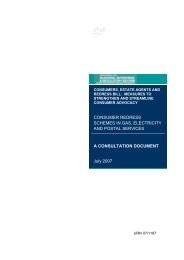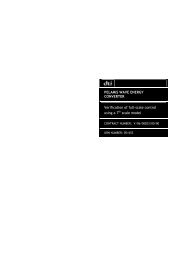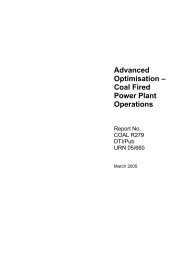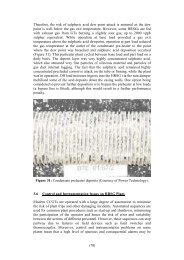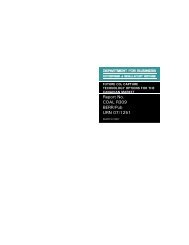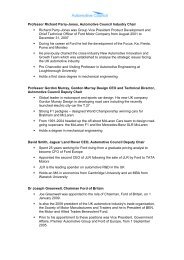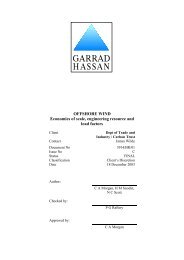A traders guide: the law relating to the - DTI Home
A traders guide: the law relating to the - DTI Home
A traders guide: the law relating to the - DTI Home
Create successful ePaper yourself
Turn your PDF publications into a flip-book with our unique Google optimized e-Paper software.
Proving <strong>the</strong> fault<br />
Generally, <strong>the</strong> buyer needs <strong>to</strong> demonstrate<br />
<strong>the</strong> goods were faulty at <strong>the</strong> time of sale.<br />
This is so if he chooses <strong>to</strong> request an<br />
immediate refund or compensation<br />
(damages).<br />
There is one exception. This is when <strong>the</strong><br />
buyer is a consumer and returns <strong>the</strong> goods<br />
in <strong>the</strong> first six months from <strong>the</strong> date of <strong>the</strong><br />
sale, and requests a repair or replacement<br />
or, <strong>the</strong>reafter, a partial or full refund. In that<br />
case, <strong>the</strong> consumer does not have <strong>to</strong> prove<br />
<strong>the</strong> goods were faulty at <strong>the</strong> time of <strong>the</strong><br />
sale. It is assumed that <strong>the</strong>y were. If <strong>the</strong><br />
retailer does not agree, it is for him <strong>to</strong> prove<br />
that <strong>the</strong> goods were satisfac<strong>to</strong>ry at <strong>the</strong> time<br />
of sale. For goods returned after six months<br />
<strong>the</strong> normal rules apply so that it would be<br />
for <strong>the</strong> consumer <strong>to</strong> demonstrate <strong>the</strong>y were<br />
faulty when sold.<br />
O<strong>the</strong>r situations covered<br />
The remedies of repair, replacement, partial<br />
refund and full refund are also available <strong>to</strong><br />
consumers:<br />
where installation by <strong>the</strong> retailer is not<br />
satisfac<strong>to</strong>ry;<br />
where installation instructions have<br />
serious shortcomings;<br />
generally where a good does not match<br />
<strong>the</strong> public statements made about it by<br />
<strong>the</strong> retailer, manufacturer, importer or<br />
producer; and<br />
where a specially commissioned product<br />
has relevant failings.<br />
These are greatly simplified explanations<br />
and <strong>the</strong>y are expanded on below.<br />
Alternative dispute resolution<br />
Although buyers do sometimes take court<br />
action, in day-<strong>to</strong>-day practice this is a rare<br />
event. In <strong>the</strong> vast majority of cases, <strong>the</strong><br />
buyer and retailer are able <strong>to</strong> reach a<br />
satisfac<strong>to</strong>ry solution without any need <strong>to</strong><br />
consider going <strong>to</strong> court. Where this is not<br />
possible, use of an alternative dispute<br />
resolution procedure or trade association<br />
scheme can be considered. Buyers can seek<br />
details from <strong>the</strong> retailer, <strong>the</strong> Community<br />
Legal Service or a Citizens Advice Bureau.<br />
Advice<br />
Buyers can obtain free advice from<br />
<strong>the</strong>ir local Citizens Advice Bureau<br />
(http://www.citizensadvice.org.uk/); <strong>the</strong>ir<br />
local council's Trading Standards Department<br />
(http://www.tradingstandards.gov.uk/);<br />
<strong>the</strong> Community Legal Service<br />
(http://www.clsdirect.org.uk); <strong>the</strong> Which?<br />
Online Legal Service (http://www.which.net);<br />
<strong>the</strong> OFT's Shoppers Guide<br />
(http://www.oft.gov.uk/News/Publications/Le<br />
aflet+Ordering.htm); and solici<strong>to</strong>rs (who<br />
may charge). The <strong>DTI</strong> is not able <strong>to</strong><br />
intervene in individual disputes.<br />
5


